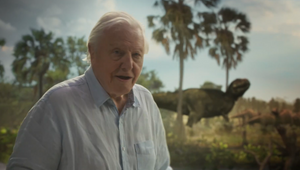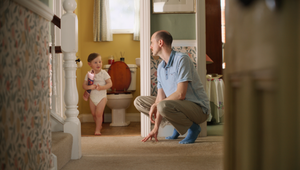
Sound Engineer Lucas Trigg on “Putting Ideas in Motion”

Lucas Trigg joined 750mph just over six months ago however, in that short time, he’s already gotten stuck in with spots like IKEA, The Red Cross, and O2. A musician from a young age, Lucas nevertheless tried his hand at “computing and IT”, believing it to be the pragmatic choice for a future career. Tedium soon took over in the way it never did when playing guitar - music was his true calling.
He headed for university where he did a creative Music Technology degree, followed by a master’s in Post Production and Sound Design. Thinking about the benefits and drawbacks of learning on the job versus going to university, Lucas believes that there’s no right or wrong way as every job will require some kind of training and learning process. He says that the first three months at 750mph have been all about absorbing how the company works and getting used to new workflows, while also getting stuck in with clients and projects.
Today, he tells LBB all about the tricky balance of collaborating on spots, his creative inspiration, and why having the boundaries of a brief clearly set out can ultimately lead to more creative freedom.
LBB> How did you get into sound engineering as a career? Was this always the plan?
Lucas> I have been making music since I was in my teens. I initially studied computing and IT, thinking there would definitely be a career in it but I just found it so tedious. Making music brought me much more joy so I studied a Music Technology course thinking I’d get a qualification, not really knowing where it would lead me. I went to university and studied a Creative Music Technology course, which is where I developed a fondness for working with audio and video together.
From there I did a master's in Post Production with Sound Design which is a bit more specific. By that point, I had decided that I wanted to work in post production rather than music. Initially, I didn’t really know if I wanted to work in film or advertising. Advertising wasn’t an avenue that I’d really considered - I always thought that I would be working in film. My thesis was about audio perception in short form audio-visual media; which piqued my interest in the creativity of audio in advertising. I started in the industry as a runner at Clearcut Sound Studios, worked my way up and was there for six years, really developing a taste for the craft.
LBB> Did you have any preconceptions of what kind of work advertising would involve? Was that at all challenged when you started working in the industry?
Lucas> Interestingly, I didn't. For me, the main difference between long form and short form, as someone who works in the industry, is that in short form, you do a bit of everything - you're recording people, you're recording foley, you're developing sound effects, you're mixing the whole thing. In long form, you specialise in one area. So, you might be a dialogue editor, or sound effects editor, or mixer, but you specialise in that area. Obviously, in short form, you do everything, so you’ve got to have a working knowledge, understanding, and a capability to do it all. Before I'd applied for either industry, that's kind of what I was doing - sound design, foley, vocals, mixing - I was inadvertently doing everything because I didn’t have a team to work on my own projects. So, my attitude to audio work lent itself to short form anyway and now I think if I was to work in long form, there would only be a few specific roles that I would not find tedious. I enjoy the variety of using different techniques and processes and working on different types of projects on a day to day basis.
LBB> As someone who went to university for this craft, versus the people who learn on the job, what do you think are the benefits of either? Do you think there's a right way of going about it?
Lucas> I think every path is valid. University gives you an insight into what avenues you could go down; so you have lecturers and people who have experience showing you a little bit before you get into the industry. What university provides is a good base grounding of technical knowledge and gives you a platform for your creative direction. So, you can walk into a job with a basic understanding of what needs to be done. Whereas if you're learning on the job, you start from scratch and there are benefits to that as well - you are taught by industry professionals to work in a tried and tested way with a professional attitude.
LBB> What attracted you to working with 750mph specifically?
Lucas> 750mph is such a creative and passionate place and so many amazing projects come through here. It's an amazing opportunity to be able to work on some of the biggest brands and with some of the biggest agencies and creative minds in the industry. Working to such a high level is a challenge which is great because it means there’s never a dull moment and you’re always learning, it pushes you to be constantly developing as an engineer.
LBB> Of all the projects you’ve worked on during your time at 750mph, which stands out the most and why?
Lucas> I worked on the IKEA spot, Infinite Play, which was a highlight because since I can remember IKEA has always been very creative when it comes to advertising. I also really enjoyed working on one of the first projects I did here, which was for the Red Cross. It was an interesting one to get right, because you don't want to overdo the sound design to keep it as real sounding as possible, but for the story to hit home, it can't be too simple.
LBB> What is your creative process like? Where do you start when a brief comes in? Do you prefer detailed briefs or open-ended briefs? Why?
Lucas> I will read the brief and then have a think about what their interpretation of the sound design is and how it can help with the narrative, how to add value with sound.
I prefer detailed briefs because I feel like if you've got a detailed brief, you know where the boundaries are, you know how you can try and push boundaries creatively to get the most out of it. Whereas if you've got an open-ended brief, it can be amazing because you have the potential to really experiment with it, but you also don't know where that line is or if you’re going in the right direction.
LBB> Do you have any creative heroes that you turn to for inspiration or is there anyone that has influenced your thinking and craft?
Lucas> There are some sound designers like Ben Burtt, who did the Star Wars sound effects, who will always serve as inspiration. He came up with things like the lightsabre and laser gun sounds, which are incredible. It's amazing watching the videos of him where he devises them. When he's doing the lightsabre, the way he performs it is he's got the video on the screen and then he's got this sound pumping out the speaker, which is a recording of the back of one of those big old TVs. He had the speaker in front of him and swiped past it using a long boom microphone like a sword, making use of what is called the Doppler effect - where the pitch of the sound goes up and down based on where it is closest to you. For example, an ambulance sounds lower pitch, if it's further away, and higher in pitch if it's close to you. Things like that I find interesting because he's using the laws of physics to influence his sound design making it sound different but in a way that our brains are used to understanding, so it works within the scene without sounding out of place.
LBB> As the advertising industry is changing, how do you think the role of music and sound is changing within that?
Lucas> I would argue it affects it to a certain extent, because you've got to constantly check how your sound design sounds, or how your mix sounds on different speakers. People will consume advertising on social media on their phone, so you've got to consider how things sound on phones too, as it's not going to sound the same as the expensive pair of speakers that I've got in the studio. You have to be conscious of that and adjust the levels accordingly. For example, the voiceover will usually pop out more in a mix on a small speaker than on the big ones because there's a lot more bass on the bigger speakers which beds the voiceover in.
LBB> As it stands, podcasts are huge now and with that comes the kind of advertising that is audio-only. For the last couple of years, brands have really been in people's ears. Is there anything that you're doing differently with audio-only ads where you don't have any visuals?
Lucas> We've worked on a lot of radio ads as well, which has obviously been a form of advertising predating TV. So, I wouldn't approach that any differently, really. One of the things I hear on podcast adverts is they get whoever's podcast it is to do the advert, so they're doing both the creative and the scripting and they're not necessarily going to be adding sound effects etc, as that is not what the client generally wants from them. At the end of the day, adverts are about building a narrative to sell something, and if it doesn't work for the narrative then it doesn't need to be there. Using the podcasters to sell products on their own podcasts is a smart idea because people respond well to their favourite celebs selling them something.
LBB> Music and sound are in some ways the most collaborative and interactive forms of creativity. Would you agree with that? Also, do you prefer to work alone or with others?
Lucas> Music and sound are very collaborative processes, particularly in post. What I think is always collaborative about post is that you are putting someone else's idea in motion to the best of your creative ability. So, when a brief or creative comes in, they have their vision in their mind, and you need to discuss with them to discover what that is and how to achieve it. From there, you craft their vision and give your own flavour to it, because that's what they're coming to you for. Collaborating and experimenting with different avenues to create the best version of the vision is the fun part.
There are also lots of other little cogs - what the client wants, what the agency wants, what we want and what the public will respond to. Once again, it all comes down to the narrative, and building the best narrative to achieve the desired goal, which is why everyone in the process has valid input. The post process involves a combination of solo work and collaboration, but it is inherently collaborative to get the most out of the making process.
LBB> Finally, what is on the horizon for you? Any dream projects you’d love to work on?
Lucas> I will keep developing as a sound engineer, and I hope to never lose the passion to create the best work I can. I am excited to have started the next chapter in my career at 750mph and have the opportunity to work on challenging projects with incredible people who produce incredible work. I am looking forward to working on more exciting projects, and learning from the talented people here and the people whose paths I cross along the way.















